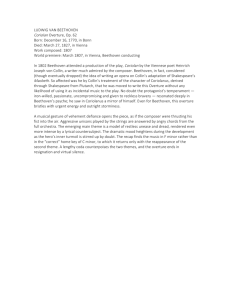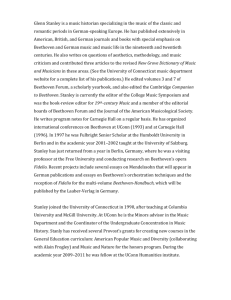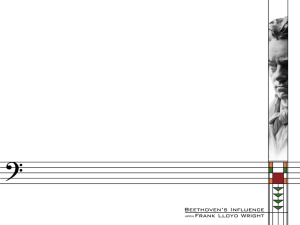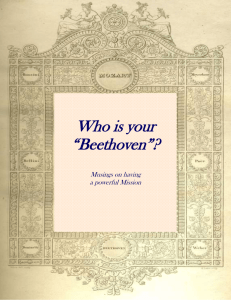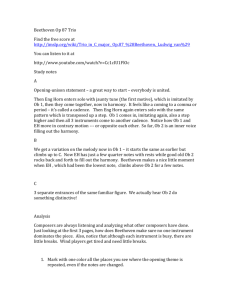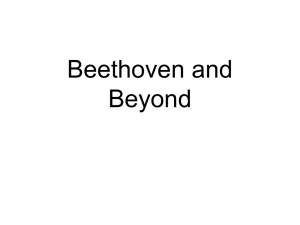Ludwig van Beethoven Biography: Early Life & Music
advertisement
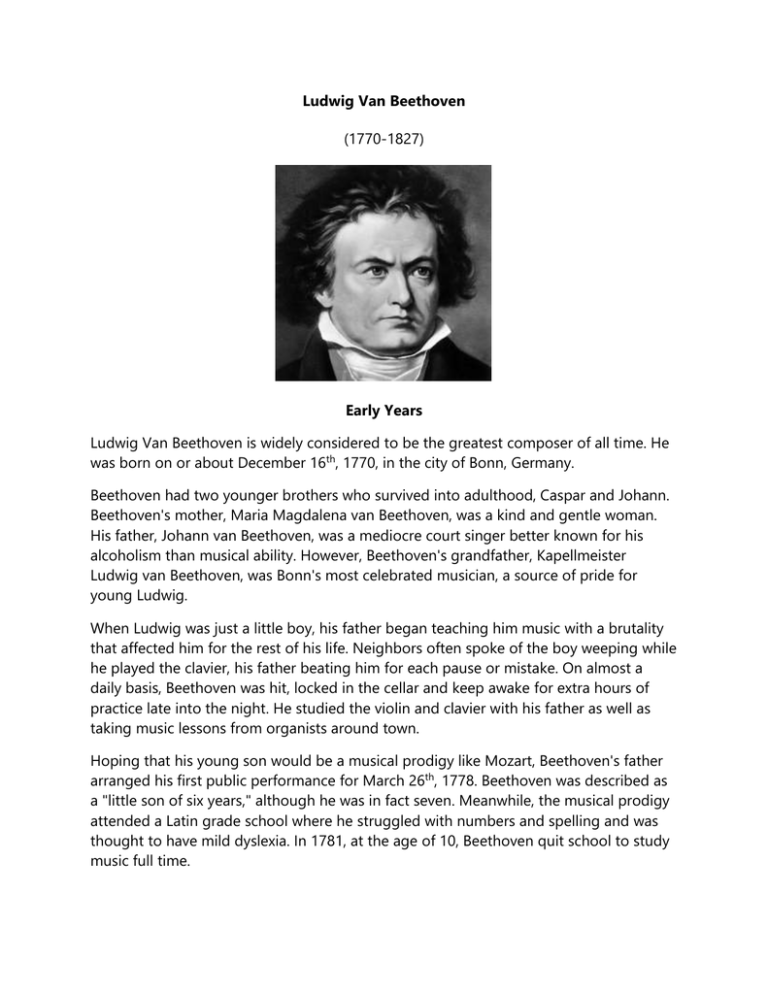
Ludwig Van Beethoven (1770-1827) Early Years Ludwig Van Beethoven is widely considered to be the greatest composer of all time. He was born on or about December 16th, 1770, in the city of Bonn, Germany. Beethoven had two younger brothers who survived into adulthood, Caspar and Johann. Beethoven's mother, Maria Magdalena van Beethoven, was a kind and gentle woman. His father, Johann van Beethoven, was a mediocre court singer better known for his alcoholism than musical ability. However, Beethoven's grandfather, Kapellmeister Ludwig van Beethoven, was Bonn's most celebrated musician, a source of pride for young Ludwig. When Ludwig was just a little boy, his father began teaching him music with a brutality that affected him for the rest of his life. Neighbors often spoke of the boy weeping while he played the clavier, his father beating him for each pause or mistake. On almost a daily basis, Beethoven was hit, locked in the cellar and keep awake for extra hours of practice late into the night. He studied the violin and clavier with his father as well as taking music lessons from organists around town. Hoping that his young son would be a musical prodigy like Mozart, Beethoven's father arranged his first public performance for March 26th, 1778. Beethoven was described as a "little son of six years," although he was in fact seven. Meanwhile, the musical prodigy attended a Latin grade school where he struggled with numbers and spelling and was thought to have mild dyslexia. In 1781, at the age of 10, Beethoven quit school to study music full time. By 1784, his alcoholism worsening and his voice decaying, Beethoven's father was no longer able to support his family. Beethoven asked to be made the Assistant Court Organist. Despite his age, he was accepted, and Beethoven was put to work. In 1787 the court decided to send Beethoven to Vienna to study with Mozart. However, only a few weeks after he arrived in Vienna, Beethoven learned that his mother had become very sick, and he immediately rushed home to Bonn. She died several months later, sending her son into a fit of depression that lasted several years. When Emperor Joseph II died in 1790, a 19-year-old Beethoven composed a musical memorial in his honor. More than a century later, Johannes Brahms discovered that Beethoven had composed this "beautiful and noble" piece of music entitled Cantata on the Death of Emperor Joseph II. It is now considered his earliest masterpiece. Composing for Audiences In 1792, with French revolutionary forces sweeping across the country, Beethoven decided to leave his hometown for Vienna again. Mozart had passed away a year earlier, leaving Joseph Haydn as the greatest composer alive. Haydn was living in Vienna at the time, and Beethoven began to study piano with him. Beethoven quickly established a reputation as an incredible pianist. He won many fans among the most wealthy of Vienna, who provided him with a home and money. Beethoven made a public debut in Vienna on March 29th, 1795. Shortly after, Beethoven published a series of three piano trios as his "Opus 1," which were an enormous success. On April 2, 1800, Beethoven debuted his Symphony No. 1 in C major at the Royal Imperial Theater in Vienna. As the new century progressed, Beethoven composed piece after piece that marked him as a masterful composer reaching his musical maturity. Beethoven also composed The Creatures of Prometheus in 1801, a wildly popular ballet. Around this time Beethoven watched with both awe and terror as Napoleon Bonaparte proclaimed himself Emperor of France. In 1804, only weeks after Napoleon proclaimed himself Emperor, Beethoven debuted his Symphony No. 3 in Napoleon's honor, later renamed the "Eroica Symphony". It was proclaimed to be one of the most original and profound pieces of music that the world had ever seen. Losing Hearing Around this time, Beethoven was struggling to come to terms with a shocking and terrible fact: He was going deaf. By the turn of the century, Beethoven struggled to make out words spoken to him in conversation. Beethoven’s deafness caused him to fall into a deep state of depression and withdraw from the public. Miraculously, despite his rapidly progressing deafness, Beethoven continued to compose at a furious pace. From 1803-1812, what is known as his "middle" or "heroic" period, he composed an opera, six symphonies, four solo concerti, five string quartets, six string sonatas, seven piano sonatas, five sets of piano variations, four overtures, four trios, two sextets and seventytwo songs. The most famous among these were symphonies No. 3-8, the "Moonlight Sonata," the "Kreutzer" violin sonata and Fidelio, his only opera. Despite his incredibly beautiful music, Beethoven was lonely and frequently miserable throughout his adult life. Short-tempered, absent-minded, greedy and suspicious to the point of paranoia, Beethoven fought with all those around him. For a variety of reasons that included his shyness and physical appearance, Beethoven never married or had children. The death of Beethoven's brother Caspar in 1815 started a painful legal battle with his sister-in-law, Johanna, over the custody of Karl van Beethoven, his nephew and her son. In the end, Beethoven won the boy's custody, but not his affections. Somehow, despite his difficult personal life and complete deafness, Beethoven composed his greatest music — perhaps the greatest music ever composed — near the end of his life. Beethoven's Ninth and final symphony, completed in 1824, remains the composer's greatest achievement. The symphony's famous choral finale, with four vocal soloists and a chorus singing the words of Friedrich Schiller's poem "Ode to Joy," is perhaps the most famous piece of music in history. Beethoven died on March 26th, 1827 at the age of 56. An autopsy revealed that the cause of death was cirrhosis of the liver. Thousands of friends and admirers attended his funeral. Ludwig van Beethoven is widely considered the greatest composer of all time. He is considered to be responsible for connecting the Classical and Romantic ages of Western music. The fact that Beethoven composed some of the greatest music of all time while deaf shows his almost super-human ability for composition. Source: "Ludwig van Beethoven Biography." www.Biography.com. A&E Networks, 2012. Web. 12 Sep 2012. <http://www.biography.com/people/ludwig-van-beethoven>


